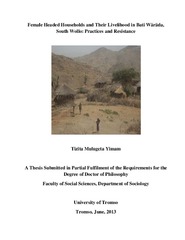| dc.contributor.advisor | Erikson, Sissel | |
| dc.contributor.author | Yimam, Tizita Mulugeta | |
| dc.date.accessioned | 2014-02-25T10:19:04Z | |
| dc.date.available | 2014-02-25T10:19:04Z | |
| dc.date.issued | 2014-02-13 | |
| dc.description.abstract | This thesis is conducted in Northern Ethiopia, Bati woreda. It explores how the existing gender relation in Bati woreda plays a role on livelihood of female headed households. Qualitative method that include semi structure interview, focus group discussion, key informant interview and observations are the main data collection instruments. Twenty female headed households that compromised of widow, divorcee and separated are the main focus of the sturdy. The thesis used the sociologist Pierre Bourdieu theory of practice as the main theoretical framework, his important concepts like habitus, field and capital are used to analyze the livelihood of female headed households and their attempt to diversity their livelihood and get social capital. The livelihood framework developed by DFID has also used as a means to prepare the interview guide and structure the analysis.
The thesis found that the way female headed households are formed play a significant role in influencing female headed household livelihood. Habitus and capitals are also found as play important concept to help to clearly understand how gender relation in the woreda function. The study has also shown that the presence and / or absence of capital play a significant role in influencing livelihood of female headed households and enabling female household heads to resist and negotiate their household livelihood. | en |
| dc.description.doctoraltype | ph.d. | en |
| dc.description.popularabstract | The thesis is about female headed households and their livelihood in Bati woreda, Northen Ethiopia. Qualitative methods that include semi structure interview focus group discussion, and observation and key informant interview is used to collect research materials. The thesis has found that gender relation in Bati woreda plays a significant role in influencing female headed household’s livelihood and their attempt to diversify their household livelihood activities. It also found that the presence or absence of capital in different forms play a vital role in influencing female household head attempt to resist social practices and negotiate their household livelihood. | en |
| dc.identifier.uri | https://hdl.handle.net/10037/5871 | |
| dc.identifier.urn | URN:NBN:no-uit_munin_5565 | |
| dc.language.iso | eng | en |
| dc.publisher | Universitetet i Tromsø | en |
| dc.publisher | University of Tromsø | en |
| dc.rights.accessRights | openAccess | |
| dc.rights.holder | Copyright 2014 The Author(s) | |
| dc.rights.uri | https://creativecommons.org/licenses/by-nc-sa/3.0 | en_US |
| dc.rights | Attribution-NonCommercial-ShareAlike 3.0 Unported (CC BY-NC-SA 3.0) | en_US |
| dc.subject | VDP::Social science: 200::Sociology: 220 | en |
| dc.subject | VDP::Samfunnsvitenskap: 200::Sosiologi: 220 | en |
| dc.title | Female Headed Households and Their Livelihood in Bati Wäräda, South Wollo: Practices and Resistance | en |
| dc.type | Doctoral thesis | en |
| dc.type | Doktorgradsavhandling | en |


 English
English norsk
norsk
